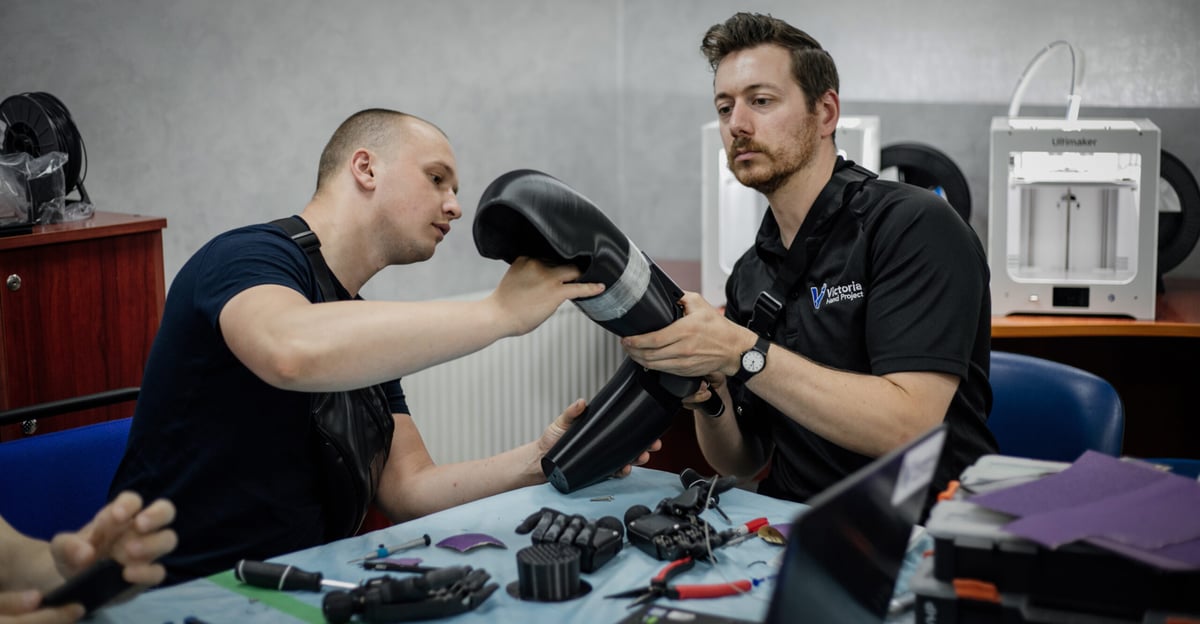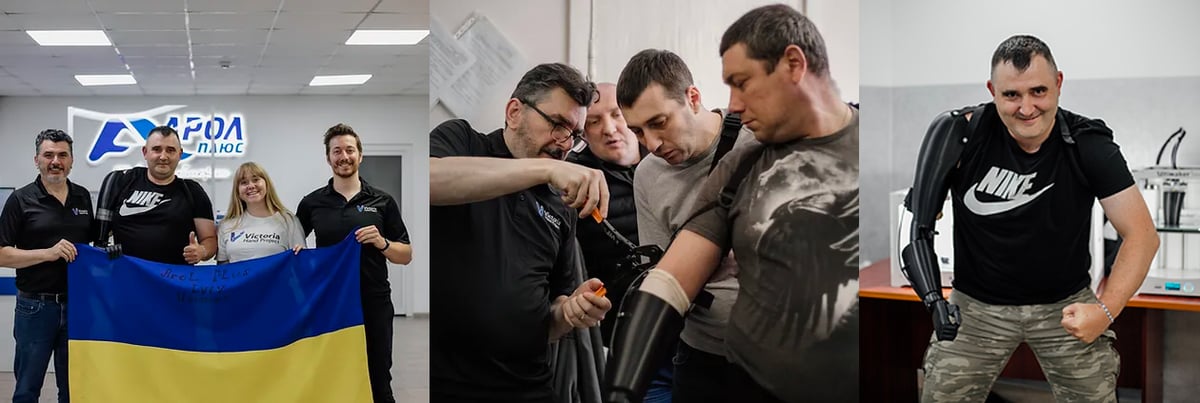Tens of thousands of Ukrainians have lost limbs due to the ongoing war. At the same time, economic and medical care disruptions have left hundreds of thousands of existing amputees in the country without access to care. One organization, armed with UltiMaker 3D printers, aims to make a difference.
The Victoria Hand Project, a Canadian charity that has already delivered hundreds of 3D printed prosthetics in 11 countries, launched Hands for Ukraine one year ago. Since then, dozens of Ukrainians have received new opportunities to regain independence and self-sufficiency through 3D printed prosthetic arms.

Victoria Hand Project began as a University of Victoria research program and quickly became a humanitarian initiative. It offers various customized 3D printed prosthetic hands to meet the needs of individuals worldwide who don’t have access to these devices. Central to its approach is the prosthetic arm socket, which is 3D printed directly on-site at the partner clinic to the exact measurements and needs of each patient.

The Victoria Hand itself was designed by the organization and is a mix of 3D printed and metallic components, featuring articulated fingers and thumbs that enable various functions.
Equipped with UltiMaker 3D printers and PLA filament from Forward AM, the project team traveled to Ukraine to bring the technology and train local practitioners on manufacturing the prosthetics themselves.
“We bring these 3D printers and this training to the clinics we work with so that everything is produced in-house, in-country,” says Kelly Knights, COO at Victoria Hand Project. “For Ukraine, it’ll be Ukrainians making hands for Ukrainians in-country, on demand.”
The organization says it selected UltiMaker printers for ease of use, reliability and quality.
“Some of the partners we work with don’t have experience in 3D printing, and the printers are easy for them to use and maintain,” says Michael Peirone, CEO of Victoria Hand Project. “Also, by standardizing the type of printer we’re using, we’re able to provide the print sets and instructions so our partners can hit the ground running on producing these prosthetic devices independently.” The organization has about 35 UltiMaker printers currently in the field.

Expanding the availability of prosthetic hands in Ukraine
The Hand Project is currently operating in Lviv and Vinnytsia, both in the west of Ukraine.
Although PLA is the primary material used for its suitability for prolonged skin contact, it’s not any PLA. BASF Pro1 PLA from Forward AM provides the lightweight durability that’s important for prosthetic devices. BASF says it’s a tough biobased PLA filament that produces better mechanical properties ABS.
From the initial consultation, it can take only two to three days to the final fitting process.
“I was very surprised about the measurements, that it was so soon, so quickly it will be done thanks to these miracle printers,” says Ukrainian limb recipient Andriy Kramar.
The Victoria Hand is a unique prosthetic device that uses body-powered mechanisms, like a shrug, to open and close. The hand is designed to be easy to use and repair, waterproof, and user-friendly. Each recipient receives a customized prosthetic arm that is fitted to their body. This includes a custom 3D printed limb socket and a standardized hand.
The Victoria Hand designs are not open-source and provided only to program partners that are registered prosthetists. The reason is to avoid the dangers of poor-fitting prosthetics, the organization says.

The Victoria Hand has two main components that are not 3D printed. The palm and fingers are printed from PLA materials, while the fingertips are crafted from silicone through a casting technique. Internal components comprise stainless steel, springs, bolts, and laser-cut steel parts for added strength. The attachment process involves securing the prosthetic arm, similar to wearing a backpack.

“We are seeing a growing influence of 3D printing on the landscape of prosthetics care,” says Knights. “When you’re working with individuals, it’s important to have custom limb socket fittings. 3D printing offers an avenue for producing intricate organic forms, which is essential to tailoring prosthetic devices to each person’s unique body but difficult to obtain through traditional manufacturing methods.”
The Victoria Hand Project envisions a broader impact by creating a variety of prosthetic and orthotic devices. The organization’s focus on upper extremity prosthetic care serves as a foundation for future innovations.
Victoria Hand Project is a registered Canadian Charity and 501(c)(3) Nonprofit. Donations are accepted at their website.
License: The text of "3D Printing Prosthetic Care For Ukraine" by All3DP Pro is licensed under a Creative Commons Attribution 4.0 International License.
